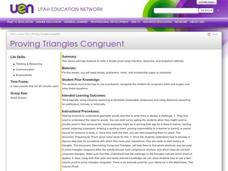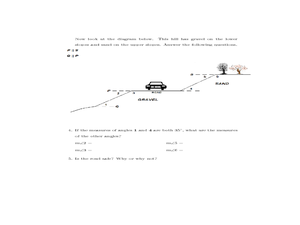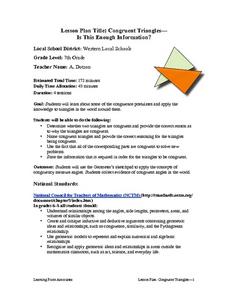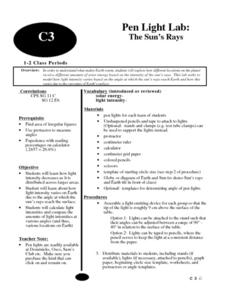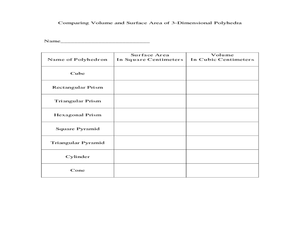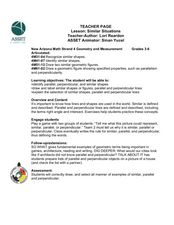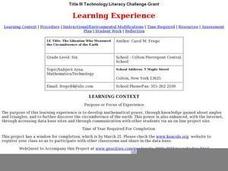Curated OER
Slosh, Dribble, and Plop
Students recognize the need for a standard unit of volume. They estimate and measure to the nearest liter. Also they relate the liter to the familiar everyday containers.
Curated OER
Spaced Out
The students are able to use a formula to calculate the volume of cuboids by measuring the length of each of the three dimensions. They also investigate the relationship between milliliters and cubic centimeters.
Curated OER
Proving Triangles Congruent
Students examine Triangle Congruency. In this measurement comparison lesson, students use inductive, deductive and analytical thinking skills to prove triangle congruency. Students analyze and record their findings on activity worksheets.
Curated OER
Perpendicular Bisector of a Line Segment
High Schoolers investigate the perpendicular bisector of a line segment. They use Cabri Jr. to construct the perpendicular bisector of a segment. The dynamics capabilities of Cabri Jr. allow your learners to observe the lengths of the...
Curated OER
Betweenness and the Sum of Parts
High schoolers differentiate lines and angles using betweenness in this geometry lesson. They differentiate angles and lines using Cabri Jr. and analyze the data and make conjecture.
Curated OER
Close Enough?
Students examine how navigation is based on mathematics and how making a mistake in measuring an angle could have an impact on a target. They observe a teacher-led lecture, use a calculator to complete two worksheets, and participate in...
Curated OER
The Tipping Point
Students rewrite word problems and solve using math. In this word problem instructional activity, students gather data and observe the data. They relate this process to the scientific method and math. They review their data to be able to...
Curated OER
Congruent Trianges - Is This Enough Information?
Seventh graders determine whether two triangles are congruent and provide an explanation to why they are not. They apply concepts of measurement of angles and collect evidence of congruent angles in the world.
Curated OER
Pythagorean Theorem
In this geometry worksheet, 10th graders solve for missing sides and angles of a triangle. They use the pythagorean theorem to solve for the unknown in a right triangle. There are 5 questions on this worksheet.
Curated OER
Pen Light Lab
Learners study what makes Earth warm and explore how different locations on the planetreceive different amounts of solar energy based on the intensity of the sun's rays. They calculate light intensities and compare the
amounts of light...
Curated OER
The Value of Volume
Students measure the perimeter and area of their polygons. In this geometry instructional activity, students calculate the volume and area using the correct tools. They calculate the time and temperature and the perimeter and side...
Curated OER
Proving Pythagoras
Students prove the theorem of Pythagoras. In this Pythagorean Theorem lesson, students define the different parts of a right triangle. They use the Pythagorean Theorem to solve for the missing sides and angles of a right triangle.
Curated OER
Artistic Angles
Fifth graders explore angles by using protractors. They recognize, describe and determine the surface area and volume of three-dimensional shapes. Students recognize the right angle, acute angle, obtuse angle and vertex. They identify...
Curated OER
ndirect Measurement Technique: Using Trigonometric Ratios
Ninth graders find the height of an object that would be difficult or impossible to measure directly. They construct and use a Clinometer to measure the angle of elevation (or depression). Students create a sketch of the measurement...
Curated OER
Geometry Journal: Isosceles Triangles
In this isosceles triangles worksheet, students justify and determine the symmetry of an isosceles triangle. They explore the bisector of rectangles. This three-page worksheet contains two problems. Answers are listed on page three.
Curated OER
Similar Situations
Students explore intersecting lines. In this intersecting lines activity, students investigate shapes consisting of parallel, perpendicular, and similar lines. Students investigate these lines in shapes around them.
Curated OER
Law of Sines
In this Law of Sines worksheet, students describe, in their own words, when to use the law of sines. They give an example of a problem using the law of sines. This two-page worksheet contains one problem and a sample answer.
Alabama Learning Exchange
Origami Geometry
Origami is an excellent way to combine Japanese culture, art, and geometric shapes into one engaging instructional activity! Scholars begin by listening to the story Sadako and the Thousand Paper Cranes and learn the origin of the...
Curated OER
Geometry, Measurement & Reasoning
Students complete worksheets involving rotational symmetry. For this geometry lesson, students complete worksheets to identify rotational symmetry and rotations. They compare and contrast rotated figures. Students examine the...
Curated OER
Mathematics Within: Shape, Space & Measurement
High schoolers experiment and analyze triangulation to assess degrees of combined angles, predict polygons that tessellate as well as extending of shapes to create tessellations. They explore the concept of why some polygons tessellate...
Curated OER
Setting the Standard
Fourth graders experience and practice measuring and weighing objects. They describe relationships among units of measure for length, capacity, and weight, and determine measurements of angles utilizing appropriate tools. Groups are...
Curated OER
Try An Angle
Fifth graders classify the different triangles by sides and angles. They discover how many different ways they can arrange 2, 3, 4 ...7 tangram pieces to create triangles. They classify and label the six triangles on their pattern sheet.
Curated OER
The Librarian Who Measured the Circumference of the Earth
Sixth graders explore angles, triangles, and investigate the circumference of the earth. They participate in a Webquest, access data bases, and communicate with other students through an on-line project site involving the circumference...
Curated OER
Measuring Water Temperature
Learners measure the temperature of three water sources. They collect data points every second for twenty five seconds for each sample using Lego Robolab temperature sensors, complete a worksheet, and analyze the data.




